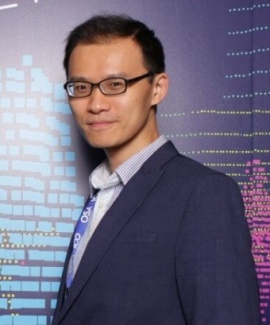Liao
Ting is originally from Taiwan, where he received his Bachelor of Science degree in Space Science and Master of Science degree in physics. After working in the semiconductor and x-ray industries for two years, he came to the US to study optics. Ting received his PhD degree in Optical Sciences from the University of Arizona in 2017. He then joined the KM group in the 2017 summer as a Postdoctoral Associate working on EUV and soft x-ray spectroscopy and imaging experiments. Since 2021, Ting became a Senior Research Associate and serves as Assistant Director of Research and Knowledge Transfer of STROBE, NSF Science and Technology Center. His research interests are developing and utilizing coherent light sources from infrared to x-ray regimes to study condensed matter physics and materials science. Taking advantage of both tabletop and facility-scale x-rays, his work characterizes nano and quantum materials, and light-matter interactions on a nanometer spatial scale and femtosecond timescale. Ting is currently working on developing new light sources and imaging capabilities for the high-resolution nanoscale bioimaging of tomorrow.
Honors & Awards
-2019 R&D100 Award
-2019 Finalist (top 4), APS Carl E. Anderson Division of Laser Science Dissertation Award
-2018 Finalist (top3), WAGS-ProQuest Innovation in Technology Award



 The Physics Frontiers Centers (PFC) program supports university-based centers and institutes where the collective efforts of a larger group of individuals can enable transformational advances in the most promising research areas. The program is designed to foster major breakthroughs at the intellectual frontiers of physics by providing needed resources such as combinations of talents, skills, disciplines, and/or specialized infrastructure, not usually available to individual investigators or small groups, in an environment in which the collective efforts of the larger group can be shown to be seminal to promoting significant progress in the science and the education of students. PFCs also include creative, substantive activities aimed at enhancing education, broadening participation of traditionally underrepresented groups, and outreach to the scientific community and general public.
The Physics Frontiers Centers (PFC) program supports university-based centers and institutes where the collective efforts of a larger group of individuals can enable transformational advances in the most promising research areas. The program is designed to foster major breakthroughs at the intellectual frontiers of physics by providing needed resources such as combinations of talents, skills, disciplines, and/or specialized infrastructure, not usually available to individual investigators or small groups, in an environment in which the collective efforts of the larger group can be shown to be seminal to promoting significant progress in the science and the education of students. PFCs also include creative, substantive activities aimed at enhancing education, broadening participation of traditionally underrepresented groups, and outreach to the scientific community and general public.